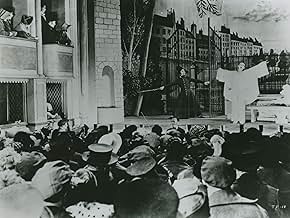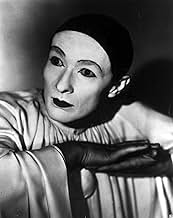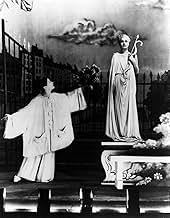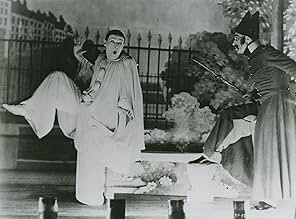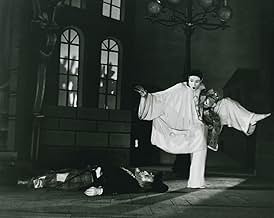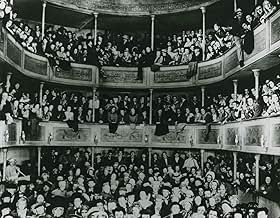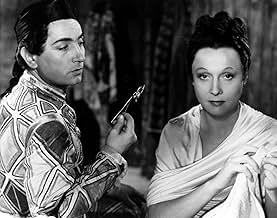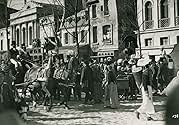ÉVALUATION IMDb
8,3/10
22 k
MA NOTE
La vie d'une belle courtisane et des quatre hommes qui l'aiment.La vie d'une belle courtisane et des quatre hommes qui l'aiment.La vie d'une belle courtisane et des quatre hommes qui l'aiment.
- Nommé pour 1 oscar
- 2 victoires et 1 nomination au total
María Casares
- Nathalie
- (as Maria Casarès)
Palau
- Le régisseur des Funambules
- (as Pierre Palau)
Etienne Decroux
- Anselme Debureau
- (as Étienne Decroux)
Jane Marken
- Mme Hermine
- (as Jeanne Marken)
Raymond Rognoni
- Le directeur du Grand Théâtre
- (as Rognoni)
Avis en vedette
it takes a real poet to write dialog this incisive, not that i speak french, but the new subtitles are very clear (visually) and concise (linguistically)... the poet was jacques prevert, the director marcel carne, and if you want to know how powerful real moviemaking can be, you have to see this picture... as in all true tragedy, the various pairs of lovers comment by their actions on each other's destinies... baptiste/garance are the main pair we care most about, but all the others contribute to and contrast with their true, genuine, doomed affair... the shadows of the main pair are baptiste/nathalie, and garance/frederick, descending to the sick depths of garance/edouard, lacenaire/avril, and jericho/himself. it's like a deck of cards with all possible combinations revealed. based on a true story, set against the theatre milieu of the 1840s, this has the world's best crowd scenes, partially because carne employed every actor in france who needed saving from the nazis, including hiding jews on the set (it was made during WWII). the use of mime advances the plot and is not simply an excuse for baptiste to show off his real-life talents (jean-louis barrault conducts a school of mime in france to this day.) the stunningly vibrant arletty plays garance, a whore with a heart, as if such a thing had never happened before... and until she did it her way, it hadn't...
10geroldf
*Enfants* is a work of genius. I won't say it's the greatest film of all time, because its scope is very narrow: the mystery of the heart, the wayward course of love, the bittersweet joy and sorrow of lovers. Maybe that isn't so narrow after all, but it doesn't cover quite as wide a spectrum as other great films (seven samurai, casablanca, mahabharata, key largo etc). Nonetheless, this film belongs in that same company, for an unsurpassed portrayal of loves lost and won, and also the passion of art, a form of love expressing itself in public creativity, enriching the lives of many. Love between lovers enriches them alone; art enriches the world.
The woman Garance is loved by 4 men in this film. Two of them, at least, are superb renditions of genius-in-creation: the mime Baptiste, and the actor Frederick. Both are geniuses, but while Baptiste is silent, weak, and sad, Frederick is loud, powerful, irrepressively optimistic, courageous and generous. He is one of the greatest characters ever to grace the screen. He has one flaw: his genius is so pure, he has a blind spot regarding the weaknesses of others. He cannot conceive of an emotion such as jealousy, and so can never play Iago - until Garance, the fallen woman, finally teaches him.
The other character who may be a genius is Lacenaire, but he is a criminal genius. Evil, twisted, burning with hatred, he has only one true and honest anchor in society - his love for Garance. It doesn't save him, but it keeps him from being as bad as he could be.
Without going into the whole plot (it's long and convoluted) the primary paradox relates to intersecting and disconnected paths of love between the characters. Garance is loved by 4 men, but she really only loves Baptiste. So does Nathalie, a sweet and simple girl, who has the courage to do what Baptiste can not: she declares her love, and so they marry and have a child. Baptiste lacks the strength to take Garance when he has the chance, and so no one is happy - except maybe Frederick, he lives as life should be lived, and even the pain of losing Garance turns to gold in the alchemy of his art.
But despite the pain, and the unhappiness, loss and death, the world of *enfants* is beautiful. It's a world where love and art mean more than success or failure, a world where money is irrelevant and the passion for life burns away the curtain between fantasy and reality. It's three hours of *paradis*!
10/10, with a bullet through the heart.
The woman Garance is loved by 4 men in this film. Two of them, at least, are superb renditions of genius-in-creation: the mime Baptiste, and the actor Frederick. Both are geniuses, but while Baptiste is silent, weak, and sad, Frederick is loud, powerful, irrepressively optimistic, courageous and generous. He is one of the greatest characters ever to grace the screen. He has one flaw: his genius is so pure, he has a blind spot regarding the weaknesses of others. He cannot conceive of an emotion such as jealousy, and so can never play Iago - until Garance, the fallen woman, finally teaches him.
The other character who may be a genius is Lacenaire, but he is a criminal genius. Evil, twisted, burning with hatred, he has only one true and honest anchor in society - his love for Garance. It doesn't save him, but it keeps him from being as bad as he could be.
Without going into the whole plot (it's long and convoluted) the primary paradox relates to intersecting and disconnected paths of love between the characters. Garance is loved by 4 men, but she really only loves Baptiste. So does Nathalie, a sweet and simple girl, who has the courage to do what Baptiste can not: she declares her love, and so they marry and have a child. Baptiste lacks the strength to take Garance when he has the chance, and so no one is happy - except maybe Frederick, he lives as life should be lived, and even the pain of losing Garance turns to gold in the alchemy of his art.
But despite the pain, and the unhappiness, loss and death, the world of *enfants* is beautiful. It's a world where love and art mean more than success or failure, a world where money is irrelevant and the passion for life burns away the curtain between fantasy and reality. It's three hours of *paradis*!
10/10, with a bullet through the heart.
It is an epic. One of the best films ever made. The script and the dialogues show that the genius of Jacques Prévert wasn't made only for written poetry but for poetry in motion as well.Carné's camera is precise and makes one feel like a real witness of the plot. All in all a lesson of how to make a film yesterday, today and tomorrow.
One day in 1966 I was walking along 8th Street in the Village. The Village was where I went when I had no where else to go, when I belonged no where, where I thought I could discover myself. It didn't hurt that there were people to stare at, without being too obvious about it.
It was a gray day and it started to rain. I stopped under the first protection I found, a movie marque - neither handsome nor attractive.
The photos promoting the film were behind glass at odd angles, held by tacks. I just wasn't in the mood. It wasn't what I was looking for. But the rain got worse, and I needed warmth. So I bought my ticket to join the twenty or so people who comprised the full audience.
From its first moment, the film pulled me in. After a frenetic start, it quieted to Jean-Louis Barrault sitting alone on a barrel. I'd seen Marceau before, but not until now had I seen the quiet poetry of true mime.
Barrault's character, Baptiste, had silently observed the theft of a watch. Baptiste pantomimed the theft but staged his pantomime as if people's perceptions were a mistake, as if the theft never took place. In the doing, he made everyone laugh. He did this for the love of Garance, played by Arletty, whom he had seen for the first time.
There follows in the film first love - unrequited, poetic, soulful. We see villainy, melodrama, danger, heroism, satire, plays within plays - a host of stories all integral to the whole of the play. And we believe completely.
It is the most complete film ever made. It changed my life.
It was a gray day and it started to rain. I stopped under the first protection I found, a movie marque - neither handsome nor attractive.
The photos promoting the film were behind glass at odd angles, held by tacks. I just wasn't in the mood. It wasn't what I was looking for. But the rain got worse, and I needed warmth. So I bought my ticket to join the twenty or so people who comprised the full audience.
From its first moment, the film pulled me in. After a frenetic start, it quieted to Jean-Louis Barrault sitting alone on a barrel. I'd seen Marceau before, but not until now had I seen the quiet poetry of true mime.
Barrault's character, Baptiste, had silently observed the theft of a watch. Baptiste pantomimed the theft but staged his pantomime as if people's perceptions were a mistake, as if the theft never took place. In the doing, he made everyone laugh. He did this for the love of Garance, played by Arletty, whom he had seen for the first time.
There follows in the film first love - unrequited, poetic, soulful. We see villainy, melodrama, danger, heroism, satire, plays within plays - a host of stories all integral to the whole of the play. And we believe completely.
It is the most complete film ever made. It changed my life.
"Les Enfants du Paradis" is my favorite movie of all time, and if you don't agree with me, you must admit it's surely one of the most beautiful. The film is about one woman, Garance (Arletty), who is loved by many men in early Paris. It is definitely Marcel Carne's crowning achievement, and to think this movie was even made is a miracle. Sadly, this movie is unseen by many, and isn't even on IMDb's Top 250 list. It's really too bad that such a stunning film would be so underrated. Please take my word, overlook the running time, and check out "Children of Paradise." (****/****)
Le saviez-vous
- AnecdotesFilming was completed a short time before D-Day and the director, having planned to distribute the film after the liberation of France, had three copies printed and concealed in three different places: a cellar of the Banque de France, a strongbox of Pathé and a Provence country house.
- GaffesIn the outdoor market scene, the amount of food laid out on the tables varies from shot to shot. The reason is that the extras were famished from years of wartime food rationing, and stole food whenever they were not closely watched.
- Citations
Frederick: Words and phrases leave you cold. You tell your story without speaking. And you do it so well. You really astonished me. Your legs speak, your hands answer. A glance, a shrug, a step forward, back and they understand up in the Gods.
Baptiste: They understand, though they are poor. I'm like them. I love them, I know them. Their lives are small, but their dreams are vast.
- Autres versionsThere are various alternate cuts of this film; the complete version runs 195 minutes and has been restored on video.
- ConnexionsEdited into Il était une fois...: Les enfants du paradis (2009)
Meilleurs choix
Connectez-vous pour évaluer et surveiller les recommandations personnalisées
- How long is Children of Paradise?Propulsé par Alexa
Détails
Box-office
- Budget
- 58 000 000 F (estimation)
- Brut – États-Unis et Canada
- 36 986 $ US
- Fin de semaine d'ouverture – États-Unis et Canada
- 10 741 $ US
- 11 mars 2012
- Brut – à l'échelle mondiale
- 44 906 $ US
- Durée3 heures 9 minutes
- Couleur
- Mixage
- Rapport de forme
- 1.37 : 1
Contribuer à cette page
Suggérer une modification ou ajouter du contenu manquant

Lacune principale
By what name was Les enfants du paradis (1945) officially released in India in Hindi?
Répondre


